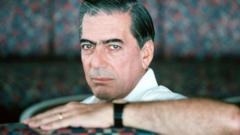**Vargas Llosa's works challenged authority while addressing the complexities of his region's historical backdrop, transforming him into a luminary of the literary world.**
**Mario Vargas Llosa: A Literary Titan Passes Away at 89**

**Mario Vargas Llosa: A Literary Titan Passes Away at 89**
**Renowned Peruvian author and Nobel laureate, Mario Vargas Llosa, has died, leaving a lasting legacy in Latin American literature.**
Mario Vargas Llosa, the renowned Peruvian author and Nobel Prize laureate, passed away in Lima at the age of 89, marking the end of an era in Latin American literature. Celebrated for his provocative narratives, Vargas Llosa produced over 50 notable works, many translated worldwide, earning him acclaim as a master storyteller. His Nobel Prize win in 2010 highlighted his remarkable ability to weave tales filled with complex themes of violence, power, and societal struggle—elements synonymous with the Latin American Boom literary movement of the 1960s and 1970s.
Born in 1936 in Arequipa, Peru, Vargas Llosa had an impactful childhood marked by familial changes. Initially raised in Bolivia, he returned to Peru at age 10 and began his literary journey by writing plays. His first novel, "The Time of the Hero," published in 1962, critiqued the corruption and brutality of the military, drawing from his own experiences at the military academy. The work faced severe backlash from military authorities, illustrating his courageous stance against injustice.
Vargas Llosa’s second novel, "The Green House," further solidified his reputation, exploring the country's socio-political landscape through a complex narrative structure. His work became a defining element of the Latin American Boom alongside contemporaries like Gabriel García Márquez. Their rivalry was marked by a dramatic altercation in 1976, reflecting the tension between their differing political ideologies, particularly regarding Cuba.
Throughout his career, Vargas Llosa navigated the realms of politics and literature, advocating for democracy and civil liberties. After initially supporting left-wing ideologies, he became disillusioned and shifted to a more conservative political stance, culminating in a presidential run in 1990 with the Frente Democrático party. His views often sparked controversy, including criticism for remarks on journalism and feminism, which drew various public reactions.
Notably, his works delve into the tumultuous political landscape of Latin America, and he actively engaged in social issues, such as the investigation of the Uchuraccay massacre in Peru. Despite controversies, his literary contributions such as "The Feast of the Goat" and adaptations like "Aunt Julia and the Scriptwriter" helped establish him as a pivotal figure in global literature.
Vargas Llosa lived between Peru and Spain later in life, leading a life filled with public interest, especially following his separation from his ex-wife and relationship with prominent socialite Isabel Preysler. He passed away peacefully, surrounded by family, leaving behind a legacy as one of Latin America's literary giants. His death leaves a void in the literary landscape, heralding the end of an era of influential voices from the Latin American Boom.




















